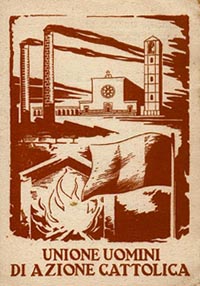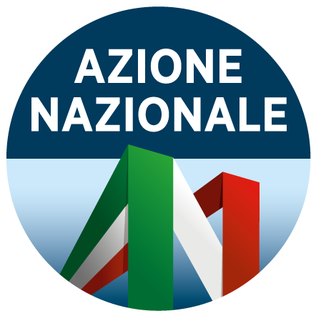
Alceste De Ambris was an Italian syndicalist, the brother of fascist politician Amilcare De Ambris. He had a major part to play in the agrarian strike actions of 1908 in Parma.
Fascio is an Italian word literally meaning "a bundle" or "a sheaf", and figuratively "league", and which was used in the late 19th century to refer to political groups of many different orientations. A number of nationalist fasci later evolved into the 20th century Fasci movement, which became known as fascism.

The Italian Republican Party is a liberal and social-liberal political party in Italy. Founded in 1895, the PRI is the oldest political party still active in Italy.

The Sardinian Action Party is a Sardinian nationalist, regionalist and separatist political party in Sardinia. While being traditionally part of the Sardinian centre-left, the party has also sided with the centre-right coalition and, more recently, with the League.

The Azione Cattolica Italiana, or Azione Cattolica for short, is a widespread Roman Catholic lay association in Italy.
Catholic Action is the name of groups of lay Catholics who advocate for increased Catholic influence on society. They were especially active in the nineteenth century in historically Catholic countries under anti-clerical regimes such as Spain, Italy, Bavaria, France, and Belgium.

The Fasci Italiani di Combattimento was an Italian Fascist organization created by Benito Mussolini in 1919. It was the successor of the Fascio d'Azione Rivoluzionaria, being notably further right than its predecessor. The Fasci Italiani di Combattimento was reorganized into the National Fascist Party in 1921.
The Action Party was a liberal-socialist political party in Italy. The party was anti-fascist and republican. Its prominent leaders were Carlo Rosselli, Ferruccio Parri, Emilio Lussu and Ugo La Malfa. Other prominent members included Leone Ginzburg, Ernesto de Martino, Norberto Bobbio, Riccardo Lombardi, Vittorio Foa and the Nobel-winning poet Eugenio Montale.

Ugo La Malfa was an Italian politician and an important leader of the Italian Republican Party.
Italian anarchism as a movement began primarily from the influence of Mikhail Bakunin, Giuseppe Fanelli, and Errico Malatesta. Rooted in collectivist anarchism, it expanded to include illegalist individualist anarchism, mutualism, anarcho-syndicalism, and especially anarcho-communism. It participated in the biennio rosso and survived Italian Fascism. Platformism and insurrectionary anarchism were particularly common in Italian anarchism and continue to influence the movement today. The synthesist Italian Anarchist Federation appeared after the war, and autonomismo and operaismo especially influenced Italian anarchism in the second half of the 20th century.

Giuseppe "Pino" Romualdi' was an Italian right-wing politician who served both the Republican Fascist Party (PFR) and the Italian Social Movement (MSI). He was the subject of frequent rumours that he was the biological son of Benito Mussolini, although no proof has been given. Romualdi himself, who was from the same village as Mussolini, encouraged the rumour.
Cesare Rossi was an Italian fascist leader who later became estranged from the regime.
The Fascio Rivoluzionario d'Azione Internazionalista was a political programmatic manifesto that advocated Italy's participation in World War I on the side of the Triple Entente against the Central Powers. It was drawn up on 5 October 1914 by revolutionary syndicalists and interventionists members of the Unione Sindacale Italiana. The usefulness of the First World War was asserted as an historical moment indispensable for the development of more advanced societies in a political-social sense. The manifesto inspired the formation of the Fasci d'Azione Rivoluzionaria.
The Fascio d'Azione Rivoluzionaria was an Italian political movement founded in 1914 by Benito Mussolini, and active mainly in 1915. Sponsored by Alceste De Ambris, Mussolini, and Angelo Oliviero Olivetti, it was a pro-war movement aiming to promote Italian entry into World War I. It was connected to the world of revolutionary interventionists and inspired by the programmatic manifesto of the Fascio Rivoluzionario d'Azione Internazionalista, dated 5 October 1914.

The International Marxist Tendency (IMT) is an international Trotskyist political tendency founded by Ted Grant and his supporters following their break with the Committee for a Workers' International in 1992. The organization's website, Marxist.com or In Defence of Marxism, is edited by Alan Woods. The site is multilingual, and publishes international current affairs articles written from a Marxist perspective, as well as many historical and theoretical articles. The IMT is active in over 40 countries worldwide.

National Action was a conservative political party in Italy.
Arrigo Cervetto was an Italian communist revolutionary and politician. He was the co-founder of the newspaper Lotta Comunista with Lorenzo Parodi.
Lorenzo Parodi was an Italian trade unionist, communist revolutionary and politician, founder in 1965 of Lotta Comunista with Arrigo Cervetto.

The Maximalist Italian Socialist Party or PSIm, was the residual part of the Italian Socialist Party in exile following the split that occurred during the first phases of the Socialist Convention of Grenoble, held on 16 March 1930, by Pietro Nenni and the fusionist fraction.
Action is a liberal political party in Italy. Its leader is Carlo Calenda, a member of the European Parliament within the group of Renew Europe and former minister of Economic Development.









